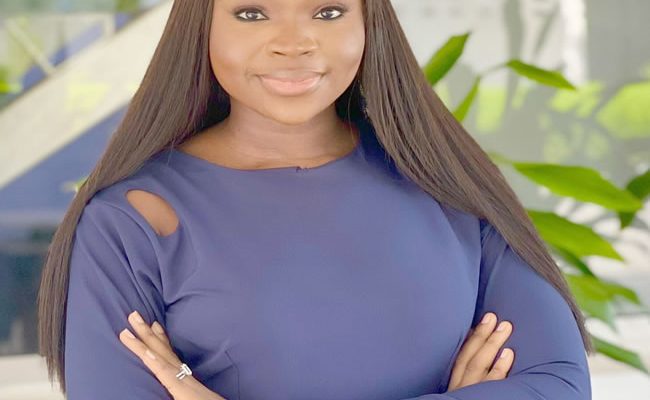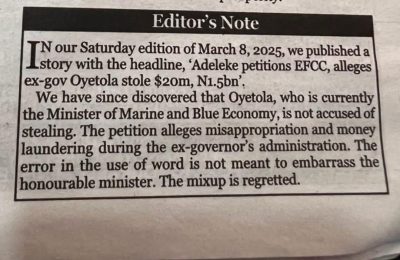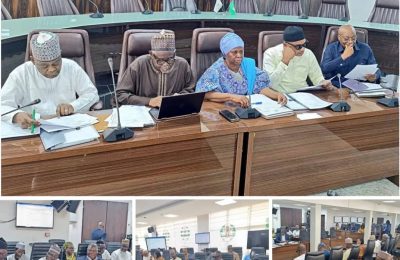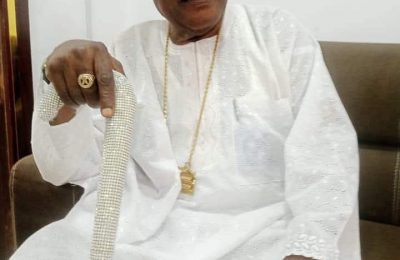Chinenye Adeleye is a social entrepreneur and a humanitarian. As the founder of Volunteers Hub Africa, she and her team have trained and mentored over 2000 women and youths in non-profit endeavours. In this interview by Awau Adegoke, she speaks about her work, women empowerment, and other related issues.
With a university degree in counseling psychology, how were you able to transition into edtech, social entrepreneurship, and project management?
My journey is less about a sharp transition and more about a natural evolution of purpose. Counselling psychology taught me something profound: change happens not just through individual interventions but through systemic empowerment. Therefore, every intervention I design, whether in education, technology, or social entrepreneurship is fundamentally rooted in understanding human potential and creating pathways for personal and collective growth.
Over the years, my evolution was facilitated by continuous learning, networking, and a commitment to applying my skills in diverse contexts to empower women and youth. When I realised that my education in psychology could extend beyond traditional counselling frameworks, I saw an opportunity to address broader societal challenges. Project management became my toolkit for translating empathetic understanding into structured, scalable solutions.
At Volunteers Hub Africa, for instance, I leverage psychological insights to build teams, design programmes, and create environments where professionals can contribute meaningfully to social causes.
Tell us about your work at Del-York and the Youths in Animation and Post Production Initiative (YAPPI). What makes your work in these places worthwhile?
YAPPI transcends skill training — we are fundamentally reimagining representation and economic opportunities for women in Africa’s creative industries (animation and post-production). By partnering with the Mastercard Foundation to train 60,000 young creatives, with women and persons with disability as a priority, we are not just teaching technical skills — we are dismantling systemic barriers and creating pathways for economic empowerment.
Each woman we train represents a potential ecosystem of change. When a young woman learns animation, she is not just acquiring a skill — she is challenging traditional narratives, creating economic independence, and inspiring her community. Our work is about proving that talent is universal, but opportunity is not. We are not just filling skills gaps — we are creating generational shifts in how women perceive their capabilities and how industries perceive women’s contributions.
How long have you been working in the non-profit sector? Why did you found Volunteers Hub Africa and what impact is it making in society?
I have worked in the non-profit sector for over a decade. The experience has been both challenging and fulfilling, and each year has reinforced my belief in collaborative, strategic social change.
Volunteers Hub Africa was founded in response to the challenges faced by nonprofits in executing their projects due to limited resources and strategic capacity. By implementing a volunteer outsourcing model, we connect skilled professionals with nonprofits, which results in more efficient and impactful project outcomes. The effectiveness of this approach is evidenced by the recognition received through over 20 awards. Additionally, we have trained and mentored more than 2,000 professionals, fostering a network of change-makers who recognise the importance of professional rigour, strategic thinking, and a genuine commitment to making a social impact.
Do you see social and humanitarian endeavours as ways to make right the things or experiences that you got wrong in the past?
My drive is not rooted in personal redemption. It is more about recognising that every systemic challenge represents an opportunity for creative and collaborative solutions. I am motivated by a vision of what is possible when we invest in human capacity, particularly for women and youth who have historically been marginalised.
Each programme and each training initiative is a deliberate investment in potential — creating platforms where individuals can reimagine their possibilities and communities can experience transformative change.
There is a saying that you cannot change someone or people who are not ready to change. In your social and volunteering work, how do you decide who really needs change?
Change is a personal journey. Change is not something imposed. It is something invited and nurtured. Our approach focuses on creating environments of opportunity where individuals can recognise and activate their own potential. We do not determine who “needs” change. We create inclusive spaces where change becomes an accessible, attractive possibility.
The impact is not just about numbers, though our metrics are significant. It is about the stories — like women who transition from economic uncertainty to becoming digital creators or nonprofits that dramatically improve their project delivery capabilities. We measure impact through longitudinal tracking, personal testimonials, and the ripple effects we observe in communities.
Could you share a success story from one of your social or community-led projects that had a significant impact on people or society?
One of our most impactful projects was a digital literacy programme for women in rural areas. We trained over 500 women, which enabled them to start new businesses and improve their economic opportunities. One single mother used her new skills to start an online business, which significantly improved her family’s financial situation. Stories like hers highlight the transformative power of education and empowerment.
You mentioned that you have trained and mentored over 2,000 volunteers. What strategies do you use to mentor people and lead teams in non-profit projects?
Mentoring and leading teams in non-profit projects require a combination of empathy, clear communication, and strategic planning. I focus on understanding each volunteer’s strengths and aspirations, providing tailored guidance and support. Regular training sessions, workshops, and one-on-one mentoring are key strategies. Fostering a collaborative and inclusive environment where everyone feels valued and heard is crucial for effective team leadership.
What is your idea of resilient entrepreneurship? And how do you think young Nigerian entrepreneurs can navigate uncertainties and build sustainable ventures?
Resilient entrepreneurship involves adapting, innovating, and persevering in the face of challenges.
For young Nigerian entrepreneurs, it is important to develop a growth mindset, stay informed about industry trends, continuously develop new skills, and build a strong network of mentors and peers. Embracing technology and being open to pivot when necessary can also help navigate uncertainties. Sustainability comes from a clear vision, strategic planning, and a commitment to creating value for customers and the community.
On the occasion of this year’s International Volunteer Day, you were in a virtual event tagged ‘Building a strong volunteer team: Recruitment, retention, and recognition’. Could you tell us the major highlights of the event?
The event focused on the key elements of building a strong volunteer team: recruitment, retention, and recognition. We discussed strategies for attracting skilled volunteers, such as leveraging social media and partnerships with educational institutions.
Retention strategies included providing meaningful and engaging volunteer experiences, offering professional development opportunities, and fostering a sense of community. Recognition was highlighted as crucial for maintaining volunteer motivation, with suggestions such as regular appreciation events, certificates, and public acknowledgement of volunteers’ contributions.
You were recently in a panel session organised by MasterCard on the occasion of the International Day of Persons Living with Disabilities under the theme ‘Amplifying the leadership of persons living with disabilities for an inclusive and sustainable future.’ With this theme in mind, what can you say to disabled persons in Nigeria?
To persons living with disabilities in Nigeria, I want to say that your voices and contributions are invaluable. Advocating your rights and seeking opportunities for leadership and empowerment is essential. Your potential is not defined by limitations but by the opportunities you create and the perspectives you bring. Our collective responsibility is to dismantle systemic barriers and create truly inclusive environments that recognise diverse capabilities.
Christmas is around the corner. What gift do you wish for Christmas, and how do you intend to spend the Christmas holidays?
For Christmas, I wish for continued progress. I plan to spend the holidays with my family, reflecting on the year’s achievements and setting new goals for the future. It’s also our anniversary month, so it’s a time for gratitude, rest, and recharging for the work ahead.
What is your advice to women in your line of work aspiring to attain the feat you have achieved?
Believe in your vision more than you fear the challenges ahead. Your dreams are valid, and your unique perspective is your greatest strength. Trust in your ability to create impact and never allow self-doubt to overshadow your goals.
Mentorship is a powerful tool on this journey. Seek mentors who inspire you and individuals who have walked a similar path and can provide guidance, encouragement, and clarity. Equally important is peer mentorship — building relationships with like-minded individuals who share your vision. Networking is equally essential. Build meaningful connections and nurture relationships with individuals who align with your values and ambitions.
As you grow, lift others with you. Champion inclusivity and create opportunities for others to thrive, especially for women who are just starting their journey. Your ability to empower others will amplify your impact and legacy.
Finally, stay true to your purpose, remembering the “why” behind your journey. Let your vision guide you, your support system sustain you, and your passion inspires others.
READ ALSO: The Vision-Driven Leader








